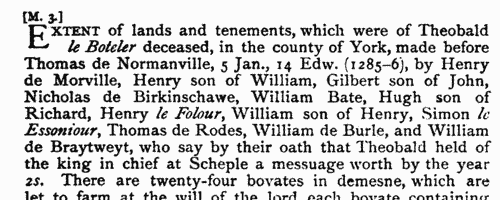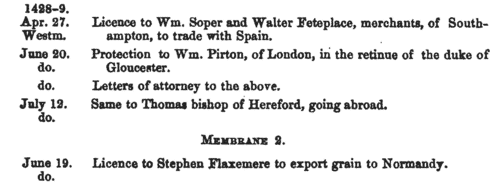Monketon Surname Ancestry ResultsOur indexes 1000-1999 include entries for the spelling 'monketon'. In the period you have requested, we have the following 13 records (displaying 1 to 10): Buy all | | | Get all 13 records to view, to save and print for £52.00 |
These sample scans are from the original record. You will get scans of the full pages or articles where the surname you searched for has been found. Your web browser may prevent the sample windows from opening; in this case please change your browser settings to allow pop-up windows from this site. Yorkshire Inquisitions
(1275-1295)
Inquisitions post mortem are inquiries as to the real estate and heir of each person holding in capite or in chief, i. e. directly, from the Crown, or whose estates had been escheated or were in ward. The age and relationship of the heir are usually recorded. Inquisitions ad quod damnum enquired as to any activities (including maladministration by local officials) that had resulted in any material loss to the Crown. Proofs of age are inquiries into the precise date of birth of an heir, usually involving local inhabitants recalling those circumstances which fixed that date in their mind. Yorkshire inquisitions for this period were edited by William Brown for the Yorkshire Archaeological Society, and printed in 1898. This index covers all names mentioned, including jurors, tenants, &c. MONKETON. Cost: £4.00.  | Sample scan, click to enlarge

| Grantees of offices, commissions and pardons
(1317-1321)
The Patent Rolls are the Chancery enrolments of royal letters patent. Those for the 11th to the 14th years of the reign of king Edward II (8 July 1317 to 7 July 1321) were edited for the Public Record Office by G. F. Handcock, and published in 1903. The main contents are royal commissions and grants; ratifications of ecclesiastical estates; writs of aid to royal servants and purveyors; and pardons. Most extensive are the commissions of oyer and terminer to justices to investigate complaints about specific crimes and wrongs in particular counties.MONKETON. Cost: £2.00.  | Sample scan, click to enlarge

| Close Rolls
(1343-1346)
The close rolls of the 17th, 18th and 19th years of the reign of king Edward III record the main artery of government administration in England, the orders sent out day by day to individual officers, especially sheriffs of shires: they are an exceptionally rich source for so early a period. There is also some material relating to Wales, Scotland, Ireland and the English possessions in France.MONKETON. Cost: £4.00.  | Sample scan, click to enlarge

| London, Essex and Hertfordshire clerks, clerics, monks and clergy
(1361-1374)
Ordinations to first tonsure, acolytes, subdeacons, deacons and priests, from the register of bishop Simon de Sudbury of London. London diocese covered Middlesex, Essex and part of Hertfordshire; the ordinations also attracted many persons from distant dioceses bearing letters dimissory from their ordinaries, and these are duly noted in the text. Many of these clerks would not go on to obtain benefices and remain celibate. The lists of subdeacons, deacons and priests state the clerks' respective titles, i. e., give the names of the person or religious house undertaking to support them. Monks and friars ('religious') are listed separately, and the lists of subdeacons, deacons and priests are also separated into beneficed and not beneficed (or 'not promoted'). The acolyte lists are unusual in giving a parish or diocese of origin.MONKETON. Cost: £6.00.  | Sample scan, click to enlarge

| Inhabitants of Yorkshire: The Ainsty
(1379)
The poll tax returns for this wapentake, the area around the city of York.MONKETON. Cost: £6.00.  | Sample scan, click to enlarge

| Court rolls of manors held by Durham priory
(1296-1384)
The cathedral priory of Benedictines (black monks) of St Cuthbert at Durham possessed many manors in the county. These were administered by halmotes, or manor courts, held in three sessions (tourns or turns) each year (here marked I., II. and III.), before the terrar (obedientiary), steward, bursar, and/or the prior himself. The court rolls recording proceedings in these courts survive from 1296, 1300, 1309, and from 1333, but with years missing, until becoming fairly continuous from 1365 onwards. Extracts from the rolls from 1296 to 1384 were edited by John Booth and published by the Surtees Society in 1886. The manors under this jurisdiction were Aycliffe, Bellasis, (Newton) Bewley, Billingham, Burdun, Chilton, Coupon, Dalton, Edmondbyers, Ferry (Hill, or Ferrycliffe), Fulwell, Harton, Hebburn, Hedworth, Hesledon, Heworth, Jarrow, Kirk Merrington, East Merrington, West Merrington and Mid Merrington, Monkton, Moorsley, Newton Ketton, Nunstanton, North and South Pittington, East and West Rainton, Ravensflat, Shields, Southwick, Spen, Usworth, Wallsend, Wardley, Wearmouth, Westoe, Willington and Wolviston. The main contents of the records are demises of land held by the bond tenants, neifs, cotmen and others, and of the demesne lands; and bye-laws and pains (penalties) for breach of these; and other minor delinquencies.
Normally, when a farm, cottage or piece of land was let to a new tenant, the name of the last tenant is also given, as well as the amount of the rent, and the amount of the gersum (fine on entry). These court rolls contain some of the only surviving evidence for the inhabitants of these townships in this period: but this publication was of extracts, and was not comprehensive. It should also be noted that the third tourn each year (III.) usually took place in January to March, and so by modern dating in the following year. Thus, the third tourn of 1296 was held on 4 March 1297.MONKETON. Cost: £4.00.  | Sample scan, click to enlarge

| Grantees of offices, commissions and pardons
(1413-1416)
The Patent Rolls are the Chancery enrolments of royal letters patent. Those for the 1st, 2nd and 3rd years of the reign of king Henry V (21 March 1413 to 20 March 1416) were edited for the Public Record Office by R. C. Fowler, and published in 1910. The main contents are royal commissions and grants; ratifications of ecclesiastical estates; writs of aid to royal servants and purveyors; and pardons. The commissions of the peace issued for the English towns and counties and entered on the rolls, being largely repetitive, have been consolidated in a single appendix.MONKETON. Cost: £2.00.  | Sample scan, click to enlarge

| The English in France
(1453)
King Henry VI of England (one of the grandsons of Charles VI of France) claimed the throne of France (and quartered the fleurs-de-lis of France with the lions of England on the royal standard) as had his predecessors since Edward III, as descendants of Philip IV of France. The English had real power or influence in Brittany, Normandy, Flanders and Gascony, and actual possession of several coastal garrisons, in particular Calais, where the French inhabitants had been replaced by English. Henry VI came to the throne only seven years after his father had trounced the French at Agincourt; but his cousin, Charles VII, who became king of France in the same year, spent his long reign rebutting the English king's claim to his throne by territorial reconquest and consolidation. The English administration kept a series of records called the French Rolls. On these are recorded royal appointments and commissions in France; letters of protection and safe-conduct to soldiers, merchants, diplomats and pilgrims travelling to France from England and returning, and to foreign legations. There are also licences to merchants to export to the Continent, and to captains to transport pilgrims. As Henry VI's reign progressed, and the English grip on northern France loosened, the French Rolls also increasingly include entries concerning the ransoming of English prisoners.MONKETON. Cost: £6.00.  | Sample scan, click to enlarge

| Yorkshire Testators and Legatees
(1426-1466)
Wills and testaments from the diocese of York (Yorkshire, Nottinghamshire, Hexhamshire, Lancashire north of the Ribble, and southwest Westmorland) registered at York. Richmond and Southwell archdeaconries had their own lower probate jurisdictions, so the wills registered at York are predominantly from the East and West Ridings and the eastern part of the North Riding of Yorkshire. In theory, wills dealt with real property and testaments with personal property, but the distinction hardly applies in practice: most of these wills are in Latin, but some are in English. Being before the Reformation, they commonly start with benefactions to churches, chantries, chapels, &c., and with provisions for the burning of candles ('lights') and saying of masses.MONKETON. Cost: £4.00.  | Sample scan, click to enlarge

| Tradesmen of York
(1272-1558)
No man or woman could trade in the city of York without having obtained 'freedom' of the city.Their names were recorded on the 'Freemen's Roll', or Register of the Freemen of the City of York, which contains about 19,900 names for this period. A list of names was prepared for each year, the year being here reckoned as starting at Michaelmas (29 September) until 1373, and thence at Candlemas (2 February). Each annual list starts with the name of the mayor and the camerarii or chamberlains. The chamberlains were freemen charged with the duty of receiving the fees of the new freemen; of seeing that only freemen traded in the city; and of preparing this roll, which was compiled from the names on their own account books from the receipts for the fees. There are three groups of freemen: those who obtained freedom after serving out an apprenticeship to a freeman; the children of freemen; and those who claimed freedom by 'redemption', i. e. by purchase or gift from the Mayor and Court of Aldermen.
MONKETON. Cost: £2.00.  | Sample scan, click to enlarge

|
| 1 | 2 |  |
Research your ancestry, family history, genealogy and one-name study by direct access to original records and archives indexed by surname.
|












